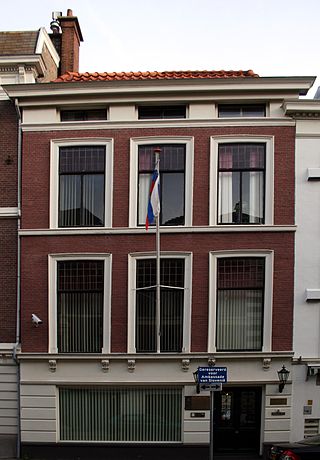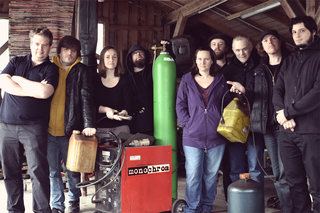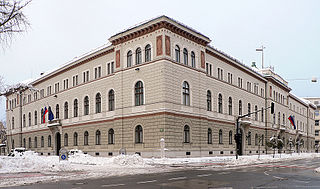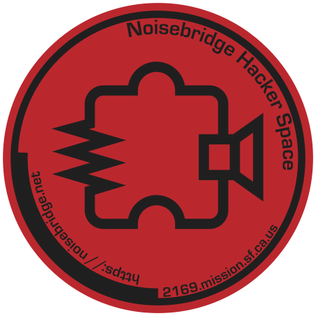
Since Slovenia declared independence in 1991, its Governments have underscored their commitment to improving cooperation with neighbouring countries and actively contributing to international efforts aimed at bringing stability to Southeast Europe. Resource limitations have nevertheless been a problem hindering the efficiency of the Slovenian diplomacy. In the 1990s, foreign relations, especially with Italy, Austria and Croatia, triggered internal political controversies. In the last eight years, however, a wide consensus has been reached among the vast majority of Slovenian political parties to jointly work in the improvement of the country's diplomatic infrastructure and to avoid politicizing the foreign relations by turning them into an issue of internal political debates.

Ljubljana is the capital and largest city of Slovenia, located along a trade route between the northern Adriatic Sea and the Danube region, north of the country's largest marsh, inhabited since prehistoric times. It is the country's cultural, educational, economic, political and administrative center.

The University of Ljubljana, abbreviated UL, is the oldest and largest university in Slovenia. It has approximately 38,000 enrolled students. The university has 23 faculties and three art academies with approximately 4,000 teaching and research staff, assisted by approximately 2,000 technical and administrative staff. The University of Ljubljana offers programs in the humanities, sciences, and technology, as well as in medicine, dentistry, and veterinary science.

Monochrom is an international art-technology-philosophy group, publishing house and film production company. It was founded in 1993, and defines itself as "an unpeculiar mixture of proto-aesthetic fringe work, pop attitude, subcultural science and political activism". Its main office is located at Museumsquartier/Vienna.

A fab lab is a small-scale workshop offering (personal) digital fabrication.

A hackathon is an event where people engage in rapid and collaborative engineering over a relatively short period of time such as 24 or 48 hours. They are often run using agile software development practices, such as sprint-like design wherein computer programmers and others involved in software development, including graphic designers, interface designers, product managers, project managers, domain experts, and others collaborate intensively on engineering projects, such as software engineering.

Radiotelevizija Slovenija – usually abbreviated to RTV Slovenija – is Slovenia's national public broadcasting organization.

The Amsterdam Subversive Center for Information Interchange (ASCII) was a squatted communication laboratory in the Dutch city of Amsterdam. The first incarnation was formed in 1999, based at Herengracht 243a. The lab then moved to the following locations: Jodenbreestraat 24, Kinkerstraat 92–94, Kostverlorenkade 2e, Wibautstraat 7 and Javastraat.
Roboexotica is an annual festival and conference where scientists, researchers, computer experts and artists from all over the world build cocktail robots and discuss technological innovation, futurology and science fiction. Roboexotica is also an ironic attempt to criticize techno-triumphalism and to dissect technological hypes.

The Metalab is a hackerspace in Vienna's central first district. Founded in 2006, it is a meeting place of the Viennese tech community, hosting events from cultural festivals to user groups. It has played a catalyst role in the global hackerspace movement and was the birthplace of several internet startup companies.

A hackerspace is a community-operated, often "not for profit", workspace where people with common interests, such as computers, machining, technology, science, digital art, or electronic art, can meet, socialize, and collaborate. Hackerspaces are comparable to other community-operated spaces with similar aims and mechanisms such as Fab Lab, men's sheds, and commercial "for-profit" companies.
The Jargon File is a glossary and usage dictionary of slang used by computer programmers. The original Jargon File was a collection of terms from technical cultures such as the MIT AI Lab, the Stanford AI Lab (SAIL) and others of the old ARPANET AI/LISP/PDP-10 communities, including Bolt, Beranek and Newman, Carnegie Mellon University, and Worcester Polytechnic Institute. It was published in paperback form in 1983 as The Hacker's Dictionary, revised in 1991 as The New Hacker's Dictionary.

The Government Building and President's Office, also simply the Government Building or the President's Office, is a building in Ljubljana, the capital of Slovenia, that houses the Office of the President of Slovenia, the Secretary-General of the Government of Slovenia, and the Protocol of Slovenia. It stands at the corner of Prešeren Street, Erjavec Street, and Gregorčič Street in the Center District, next to the Cankar Centre. It is used for state and ceremonial functions, as well as for receptions and meetings with visiting foreign dignitaries and heads of state. Occasionally, exhibits take place there.

The maker culture is a contemporary subculture representing a technology-based extension of DIY culture that intersects with hardware-oriented parts of hacker culture and revels in the creation of new devices as well as tinkering with existing ones. The maker culture in general supports open-source hardware. Typical interests enjoyed by the maker culture include engineering-oriented pursuits such as electronics, robotics, 3-D printing, and the use of computer numeric control tools, as well as more traditional activities such as metalworking, woodworking, and, mainly, its predecessor, traditional arts and crafts.

Noisebridge is an anarchistic maker and hackerspace located in San Francisco. It is inspired by the European hackerspaces Metalab in Vienna and c-base in Berlin. Noisebridge describes itself as "a space for sharing, creation, collaboration, research, development, mentoring, and learning". Outside of its headquarters, Noisebridge forms a wider international community. It was organized in 2007 and has had permanent facilities since 2008.

Hackerspace.gr ('hsgr') is a hackerspace in Athens, Greece, established in 2011. It operates as a cultural center, computer laboratory and meeting place. Hackerspace.gr promotes creative coding and hardware hacking through its variety of activities. According to its website: "Hackerspace.gr is a physical space dedicated to creative code and hardware hacking, in Athens".

Chaosdorf is a hackerspace operated by non-profit association Chaos Computer Club Düsseldorf / Chaosdorf e.V. in the city of Düsseldorf, Germany. It is Düsseldorf’s Chaos Computer Club chapter.

HackerspaceSG is a 1,202-square-foot (111.7 m2) technology community center and hackerspace in Singapore. While predominantly an open working space for software projects, HackerspaceSG is also a landmark of the Singapore DIY movement, and also hosts a range of events from technology classes to biology, computer hardware, and manufacturing. The space is open to all types of hackers.

Double Union is a San Francisco hacker/maker space. Double Union was founded by women in 2013 with the explicit goal of fostering a creative safe space. The organization’s mission is to be a community workshop where women and nonbinary people can work on projects in a comfortable, welcoming environment.

The Computer History Museum Slovenia is a museum in Slovenia dedicated to preserving the history of computing and digital heritage. Highlighting computer artifacts tied to global computer history, the museum also presents a substantial collection of items linked to early Yugoslav and Slovene computer systems.


















